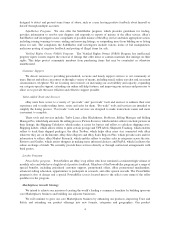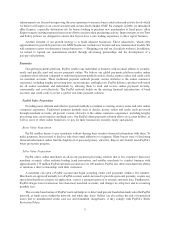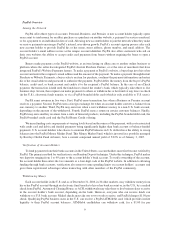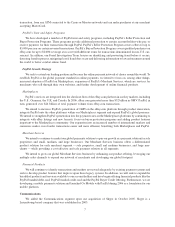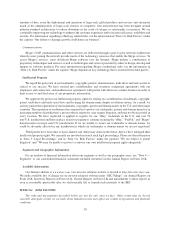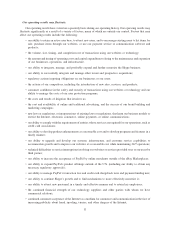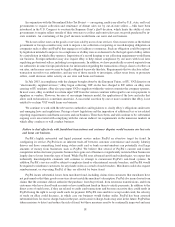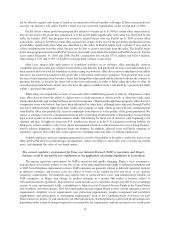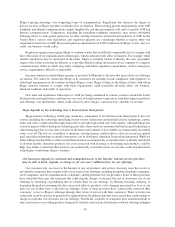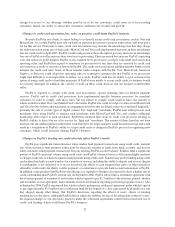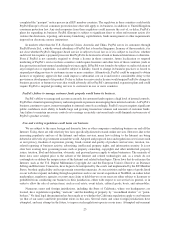eBay 2006 Annual Report Download - page 18
Download and view the complete annual report
Please find page 18 of the 2006 eBay annual report below. You can navigate through the pages in the report by either clicking on the pages listed below, or by using the keyword search tool below to find specific information within the annual report.receivable, repatriating money without adverse tax consequences, and risks relating to foreign currency exchange
rate fluctuations. The impact of currency exchange rate fluctuations is discussed in more detail under “We are
exposed to fluctuations in currency exchange rates,” below.
We are continuing to expand PayPal’s services internationally. We have limited experience with the payments
business outside of the U.S. In some countries, expansion of PayPal’s business may require a close commercial
relationship with one or more local banks or a shared ownership interest with a local entity. We do not know if these
or other factors may prevent, delay, or limit PayPal’s expansion or reduce its profitability. Any limitation on our
ability to expand PayPal internationally could harm our business.
We maintain a portion of Shopping.com’s research and development facilities and personnel in Israel, and as a
result, political, economic and military conditions in Israel affect those operations. During 2006, hostilities
escalated between Israel and Hamas in the Gaza Strip and between Israel and Hezbollah, based in Lebanon. The
future of peace efforts between Israel and its neighboring countries remains uncertain. Increased hostilities or
terrorism within Israel or armed hostilities between Israel and neighboring states could make it more difficult for us
to continue our operations in Israel, which could increase our costs. In addition, many of Shopping.com’s
employees in Israel could be required to serve in the military for extended periods of time under emergency
circumstances. Shopping.com’s Israeli operations could be disrupted by the absence of employees due to military
service, which could adversely affect its business.
We are exposed to fluctuations in currency exchange rates.
Because we conduct a significant and growing portion of our business outside the United States but report our
results in U.S. dollars, we face exposure to adverse movements in currency exchange rates. In connection with its
multi-currency service, PayPal fixes exchange rates twice per day, and may face financial exposure if it incorrectly
fixes the exchange rate or if exposure reports are delayed. PayPal also holds some corporate and customer funds in
non-U.S. currencies, and thus its financial results are affected by the translation of these non-U.S. currencies into
U.S. dollars. In addition, the results of operations of many of our internationally focused websites are exposed to
foreign exchange rate fluctuations as the financial results of the applicable subsidiaries are translated from the local
currency into U.S. dollars upon consolidation. If the U.S. dollar weakens against foreign currencies, the translation
of these foreign currency denominated transactions will result in increased net revenues, operating expenses, and
net income. Similarly, our net revenues, operating expenses, and net income will decrease if the U.S. dollar
strengthens against foreign currencies. Net revenues in the twelve-month period ended December 31, 2006 were
positively impacted by foreign currency translation of $40 million, compared to the same period of the prior year.
Operating income in the twelve-month period ended December 31, 2006 was positively impacted by foreign
currency translation of $14 million, compared to the same period of the prior year. As exchange rates vary, net sales
and other operating results, when translated, may differ materially from expectations. In particular, to the extent the
U.S. dollar strengthens against the Euro and British Pound, our European revenues and profits will be reduced as a
result of these translation adjustments. In addition, to the extent the U.S. dollar strengthens against the Euro and the
British Pound, cross-border trade related to purchases of dollar-denominated goods by non-U.S. purchasers may
decrease, and that decrease may not be offset by a corresponding increase in cross-border trade involving purchases
by U.S. buyers of goods denominated in other currencies. While we from time to time enter into transactions to
hedge portions of our foreign currency translation exposure, it is impossible to perfectly predict or completely
eliminate the effects of this exposure.
We are subject to patent litigation.
We have repeatedly been sued for allegedly infringing other parties’ patents. Some of these suits are ongoing,
as described under the heading “Item 3: Legal Proceedings,” below. We have been notified of several other potential
patent disputes, and expect that we will increasingly be subject to patent infringement claims as our services expand
in scope and complexity. In particular, we expect that we may face additional patent infringement claims involving
various aspects of our Payments and Communications businesses. These claims, whether meritorious or not, are
time consuming and costly to resolve, and could require expensive changes in our methods of doing business, or
could require us to enter into costly royalty or licensing agreements.
14


